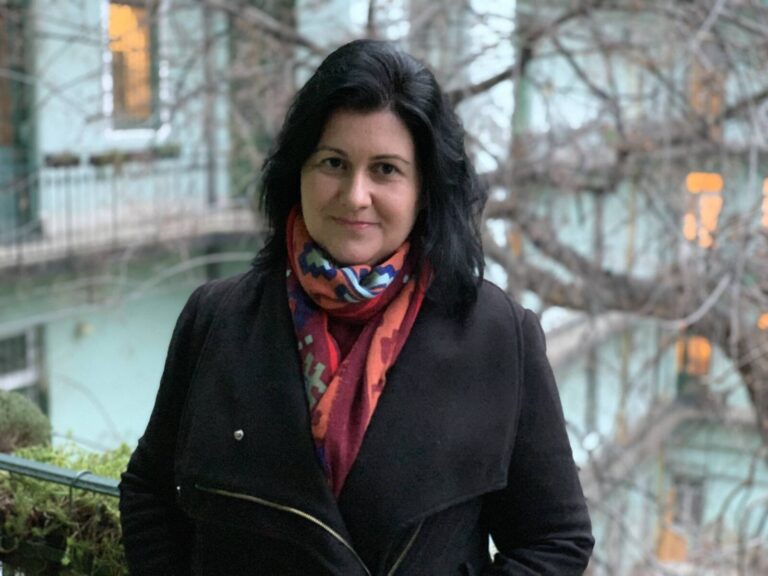Anna Gáspár-Singer: prejudice is typical in Hungary today
12/12/2022
Text translated from the article written by Kibitzer on Friday 9th of December 2022.
According to government propaganda, although antisemitism does not officially exist, it is still present in everyday life, says writer Anna Gáspár-Singer, who wrote theatrical scenes for the NOA conference against anti-Semitism in Budapest. According to the writer, it is not good for a minority if hatred is present in a society, even if it is not directly about those who belong to it.
Sport, safety, hate speech, hate crime, education, Holocaust commemoration, media, among others, writer Anna Gáspár-Singer wrote theatrical scenes about everyday Jewish life for the occasion of the NOA Conference against Anti-Semitism, which was performed by the Here and Now Company. The conference was held at the Embassy of the Czech Republic, which was attended by, among others, the Deputy State Secretary for Civil and Social Relations from the Prime Minister’s Office, religious leaders in Hungary, as well as the director of CEJI, which is based in Brussels and fights for the recognition of the diversity of Europe, and representatives of Hungarian youth organizations. We talked to the author about the conference and the theatrical scenes.
How much anti-Semitism do you think there is in Hungary today?
Officially, it obviously does not exist, since Viktor Orbán proclaimed zero tolerance for anti-Semitism a few years ago, which nevertheless continues to be present in everyday life. By the way, the report and recommendation of the NOA project on Hungary quite accurately articulates what is one of the biggest problems in Hungary: while, on the one hand, the government seems to be doing everything possible to ensure that the Jewish community lives in a friendly and safe environment, by this I mean that a synagogue is being renovated with public money, or that there is a vibrant Jewish life in Budapest, and there is no need to constantly fear regular physical atrocities, as, say, in the wilder nineties in every way, but at the same time
The propaganda against migrants, gays or otherness in general, which is present in everyday life, such as in the media, in public discourse or on the streets, is very disturbing.
But if we only take the anti-Soros campaign, the “message” formulated there has infiltrated schools or workplaces just enough, and even the street has become full of hateful signs overnight. For a minority milieu, I don’t think any form of hatred is ever good, even if it’s not specifically about him, the people who belong to it.

Have you had any personal bad experiences?
I’m actually surprised if someone who is somehow “different” or belongs to a minority has never had any bad experiences. For me, even if it doesn’t sound very good, it’s quite a basic experience of mine, although the fact is that I don’t go into certain conversations, or let’s say debates, that are clearly about anti-Semitism, Holocaust denial, racism, homophobia, etc., and are otherwise present anywhere, including in culture or even literary life, today. But I’ll point out locally that it’s really not okay. The sad thing is when with this opinion of yours, let’s say in a larger company, you are left completely alone.
Which of the stories you’ve written would you highlight as your biggest problem?
Since this is a complex problem that covers almost all areas of everyday life, I would say that the scenes I wrote are best able to convey together the situation in Hungary, which is often extremely absurd or tragicomic.



How can such a conference help?
The report itself – to which the scenes were linked as a kind of illustration or thought-provoking – always makes recommendations to the respective administration, so I would like to think that this at least acts as a call for attention.
Do you think literature and art can help advance social issues? Do you believe in sensitization?
Literature and art in general are also good because they formulate questions that can help us to think further about the problems formulated there.
All this is important for sensitisation and awareness-raising, but it is certainly not enough on its own. There is still a huge need for prevention in education, and the transfer of truly credible – and not propaganda-like – information about minorities and otherness in general simply cannot be saved if we want real change.



 NOA is co-funded by the Rights, Equality and Citizenship Programme (2014-2020) of the European Union
NOA is co-funded by the Rights, Equality and Citizenship Programme (2014-2020) of the European Union